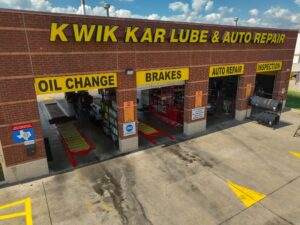Why is My Car Jerking?
Experiencing a jerking sensation when your car accelerates? This list pinpoints seven common culprits. From a simple clogged fuel filter to more complex transmission issues, understanding these potential problems will help you address the issue quickly. A correct diagnosis is crucial for preventing further damage, saving money on unnecessary repairs, and keeping you safe on Fort Worth roads. If your car jerks when accelerating, this guide will help you determine the cause.
1. Dirty or Faulty Fuel Injectors
If your car jerks when accelerating, dirty or faulty fuel injectors could be the culprit. Fuel injectors are crucial components of your vehicle's fuel delivery system. They work by spraying atomized fuel directly into the engine's combustion chambers at precise intervals, dictated by the engine control unit (ECU). This precise delivery ensures the optimal air-fuel mixture for efficient combustion and smooth engine operation. When these injectors become clogged with debris, carbon deposits, or varnish from gasoline, or if they malfunction electronically, they disrupt this delicate balance. This can lead to inconsistent fuel delivery, creating alternating periods of rich and lean fuel mixtures. This imbalance causes the engine to surge or jerk, especially noticeable during acceleration when the engine demands more fuel.

For example, imagine trying to accelerate onto a highway and experiencing a series of hesitations and jerks. This inconsistent power delivery can be both frustrating and potentially dangerous. A Fort Worth driver experiencing this issue might initially suspect transmission problems, but a diagnostic scan might reveal clogged fuel injectors as the root cause. For owners of high-mileage vehicles in Fort Worth, this is a common issue as injectors naturally accumulate deposits over time.
Fuel injectors typically have a lifespan of 50,000-100,000 miles before potential issues arise. Regular maintenance and using high-quality fuel can significantly extend their operational life. The precise amount of fuel delivered by each injector is electronically controlled by the ECU, enabling the engine to respond efficiently to changing driving conditions.
Pros:
- Often fixable with fuel system cleaners: Sometimes, a simple bottle of fuel system cleaner like Techron or Sea Foam can dissolve the deposits and restore proper injector function. This is a cost-effective solution for budget-conscious drivers in Fort Worth.
- Relatively straightforward diagnosis: A qualified mechanic can easily diagnose faulty injectors using an OBD-II scanner, quickly pinpointing the issue.
- Preventable with regular maintenance: Including regular fuel system cleanings in your maintenance schedule can prevent costly repairs down the road.
Cons:
- Complete replacement can be expensive: If cleaning doesn't resolve the issue, replacing fuel injectors can be a significant expense, ranging from $150 to $600 per injector.
- May require professional service: While some drivers might attempt cleaning themselves, professional cleaning often yields better results and ensures the injectors are thoroughly cleaned.
- Can cause catalytic converter damage if left untreated: A consistently rich fuel mixture caused by faulty injectors can damage the catalytic converter, leading to even more expensive repairs.
Tips for Fort Worth Drivers:
- Use high-quality fuel with detergents: Using top-tier gasoline with detergents helps prevent deposit buildup in the injectors and throughout the fuel system. This is particularly important for owners of aging vehicles or those concerned with preserving performance.
- Try a fuel injector cleaner: Periodically using a fuel injector cleaner can help maintain injector cleanliness and prevent performance issues.
- Have injectors professionally cleaned every 30,000 miles: For optimal performance and longevity, consider having your fuel injectors professionally cleaned as part of your regular maintenance routine. This is especially beneficial for fleet managers and small business owners in Fort Worth who rely on consistent vehicle performance.
- Consider replacing the fuel filter: If injectors are repeatedly getting dirty, it might indicate a problem with the fuel filter, which should be replaced.
If your car jerks when accelerating, addressing potential fuel injector problems is a vital step in ensuring smooth and efficient engine operation. This contributes to both improved fuel economy and a safer driving experience for Fort Worth motorists.
2. Faulty Mass Airflow Sensor (MAF)
If your car jerks when accelerating, a faulty Mass Airflow (MAF) sensor could be the culprit. This sensor is a critical component of your vehicle's electronic fuel injection system. It measures the volume of air entering the engine and relays this information to the Engine Control Unit (ECU). The ECU uses this data to determine the correct amount of fuel to inject, ensuring an optimal air-fuel mixture for combustion. When the MAF sensor malfunctions, it sends inaccurate readings to the ECU. This leads to an incorrect air-fuel mixture, which can manifest as hesitation, jerking, or surging during acceleration.

The MAF sensor is typically located between the air filter and the throttle body. It uses either a hot wire or hot film technology to measure airflow. Because it directly impacts fuel delivery calculations, even slight malfunctions can significantly affect your car's performance. The sensor itself is susceptible to contamination from dirt, debris, and oil, as well as electrical issues.
For example, a common scenario is a MAF sensor contaminated by oil from a failing PCV valve. This can lead to erratic readings and cause the car to jerk, especially under acceleration. Conversely, a failing hot wire within the MAF sensor can also cause similar issues, even without external contamination. Successfully resolving these issues often involves cleaning or replacing the MAF sensor, restoring smooth acceleration.
Tips for Dealing with MAF Sensor Issues:
- Clean the MAF sensor: Use a specialized MAF sensor cleaner spray. Never use carburetor cleaner or other harsh chemicals, as these can damage the delicate sensor elements.
- Regular air filter replacement: A clean air filter prevents contaminants from reaching the MAF sensor.
- Careful handling: When removing the MAF sensor, handle it only by the housing. Avoid touching the sensitive wire elements.
- Check for vacuum leaks: If problems persist after cleaning or replacing the MAF sensor, check for vacuum leaks, which can also cause similar symptoms.
Pros and Cons of Addressing a Faulty MAF Sensor:
Pros:
- Often fixable by cleaning: A simple cleaning can often resolve the issue, saving you the cost of a replacement.
- Relatively inexpensive: MAF sensors are generally affordable, typically ranging from $50 to $300, depending on the make and model of your vehicle. Some luxury or performance vehicles may have more expensive sensors.
- Accessible in most vehicles: The MAF sensor is usually easy to access, making cleaning or replacement a relatively straightforward task.
Cons:
- Drivability issues: A faulty MAF sensor can significantly impact drivability, making it crucial to address the problem promptly.
- Intermittent problems: The intermittent nature of MAF sensor problems can make diagnosis challenging.
- Higher cost for some vehicles: As mentioned, luxury or performance vehicles can have more expensive MAF sensors.
This issue deserves a place on this list because a faulty MAF sensor is a common cause of jerking during acceleration. It's a relatively easy and often inexpensive problem to fix, potentially saving car owners in Fort Worth from more costly repairs. This is particularly relevant for budget-conscious drivers and those with high-mileage vehicles, where regular maintenance and addressing these smaller issues can prevent larger problems down the road. A properly functioning MAF sensor contributes to optimal fuel efficiency and performance, aligning with the needs of both performance and budget-minded drivers. Companies like Bosch and Denso are major players in the MAF sensor market, highlighting the prevalence and importance of this component.
3. Transmission Issues
If your car jerks when accelerating, the transmission is a prime suspect. This complex system is responsible for transferring power from the engine to the wheels, allowing your car to change speeds smoothly. Whether your vehicle has an automatic or manual transmission, problems within this system often manifest as jerking, particularly when shifting gears or attempting to accelerate from a stop. This jerking sensation can be a subtle shudder or a violent lurch, depending on the severity of the issue. This deserves a spot on this list because transmission problems are a common culprit for jerking and can lead to costly repairs if left unaddressed.

The transmission is a sophisticated piece of machinery, comprising a complex system of gears, clutches, and hydraulics (in automatics). Automatic transmissions are controlled by a combination of mechanical, hydraulic, and electronic systems, while manuals rely primarily on mechanical and hydraulic components. Modern transmissions, particularly automatics, incorporate intricate computer controls that manage shifting and power delivery. These electronic systems add another layer of complexity to diagnosis and repair.
Several issues can lead to a jerky transmission. In automatics, these can include worn clutches, a damaged torque converter (which transfers engine power to the transmission), low transmission fluid, or problems with the electronic control module. In manual transmissions, worn clutch components, a failing clutch linkage or hydraulic system, or driver error can cause jerking during acceleration. For example, the Ford Focus models equipped with dual-clutch transmissions (DCT) between 2012 and 2016 were notorious for jerking issues, often requiring software updates or even clutch replacements. Similarly, Nissan CVT (Continuously Variable Transmission) transmissions in some 2013-2017 models demonstrated premature failure patterns leading to jerking and other drivability problems. Even high-end vehicles are susceptible, as exemplified by early ZF 8-speed transmissions in various luxury cars that exhibited software-related jerking during acceleration.
Pros of Addressing Transmission Issues:
- Some issues are relatively simple to fix: Low transmission fluid can often be resolved with a top-up, and dirty fluid can be addressed with a fluid and filter change.
- Software updates can resolve electronic glitches: In many modern vehicles, software updates can rectify electronic control issues that cause jerking.
- Early intervention can prevent catastrophic failure: Addressing minor jerking problems promptly can prevent more extensive and costly damage to the transmission.
Cons of Transmission Repairs:
- Repairs can be expensive: Transmission rebuilds or replacements can range from $1,500 to $4,000 or more.
- Specialized diagnostic equipment is often required: Accurately diagnosing transmission problems often necessitates specialized tools and expertise.
- Complete failures often require replacement or rebuilding: A completely failed transmission is a major repair.
Actionable Tips for Fort Worth Drivers:
- Check your transmission fluid regularly: Ensure the fluid is at the proper level and has a healthy red color. Don't rely solely on the "lifetime fluid" claims of some manufacturers.
- Adhere to manufacturer-recommended service intervals: Following the recommended transmission service schedule in your owner’s manual can prevent many issues.
- Address any jerking issues immediately: Don't ignore even minor jerking, as it could be an early warning sign of a more serious problem.
- Consider a transmission cooler: If you tow frequently or drive in demanding conditions, a transmission cooler can help prolong the life of your transmission.
By being proactive and addressing transmission issues early, you can avoid costly repairs and ensure a smooth and reliable driving experience in your Fort Worth vehicle. Whether you're a budget-conscious driver, a fleet manager, or simply someone who values performance and safety, maintaining your transmission is crucial for the overall health and longevity of your vehicle.
4. Spark Plug and Ignition System Problems
If your car jerks when accelerating, a faulty spark plug or other ignition system component could be the culprit. The ignition system is the heart of your engine's combustion process. It generates the spark that ignites the air-fuel mixture within the cylinders. When this process is disrupted, your engine's performance suffers, often manifesting as a jerking sensation, especially during acceleration. This can occur due to various reasons, including worn, fouled, or improperly gapped spark plugs. These issues can cause misfires, leading to the jerking motion you feel. Beyond the spark plugs themselves, other components like failing ignition coils, wires (in older vehicles), or the distributor can also create inconsistent spark delivery, resulting in poor acceleration and jerking.

Modern vehicles predominantly utilize individual coil-on-plug ignition systems, where each spark plug has its dedicated ignition coil. This setup offers greater precision and efficiency compared to older distributor-based systems with spark plug wires. Furthermore, the ignition timing in modern cars is precisely controlled by the Engine Control Unit (ECU), further optimizing performance and fuel efficiency. However, even with these advancements, problems can still arise.
For example, certain Ford Ecoboost engines have been known to experience issues with ignition coils and spark plugs, leading to jerking during acceleration. Similarly, BMW N54 engines are notorious for coil failures, and Subaru EJ series engines often require adherence to specific spark plug replacement intervals to prevent acceleration problems. These examples highlight the importance of addressing ignition system issues promptly.
Pros of Addressing Spark Plug and Ignition System Issues:
- Relatively inexpensive to repair: Spark plugs themselves are generally affordable, typically ranging from $15-$25 each.
- DIY-friendly maintenance: For many vehicles, replacing spark plugs is a relatively straightforward task that can be performed at home with basic tools.
- Noticeable performance improvement: Fresh spark plugs and a properly functioning ignition system can restore lost engine performance and improve fuel efficiency.
Cons of Addressing Spark Plug and Ignition System Issues:
- Premium vehicles may require more expensive plugs: Some high-performance or luxury vehicles require platinum or iridium spark plugs, which are more expensive than standard copper plugs.
- Difficult access on some engines: Depending on the engine design, accessing the spark plugs can sometimes be challenging and require specialized tools or even partial disassembly of engine components.
- Ignition coil replacement can be costly: If multiple ignition coils fail, the repair costs can escalate significantly, ranging from $50-$300 per coil.
Actionable Tips:
- Adhere to manufacturer recommendations: Replace spark plugs according to your vehicle's recommended maintenance schedule (typically every 60,000-100,000 miles).
- Use the correct components: Always use the factory-recommended spark plug type and gap for optimal performance and to avoid potential damage.
- Inspect spark plug condition: Regularly checking the condition of your spark plugs can provide valuable insights into the overall health of your engine and help diagnose other potential issues.
- Proactive coil replacement: If your vehicle has high mileage, consider replacing the ignition coils when replacing the spark plugs as a preventative measure.
- Use dielectric grease: Applying dielectric grease to the spark plug boots helps prevent moisture buildup and corrosion, ensuring a reliable connection.
Addressing spark plug and ignition system problems is crucial for maintaining a smooth and efficient driving experience. A properly functioning ignition system not only eliminates jerking during acceleration but also improves fuel economy, reduces emissions, and extends the life of your engine. By following the tips above and addressing any issues promptly, you can keep your car running smoothly for years to come.
5. Clogged Fuel Filter
If your car jerks when accelerating, a clogged fuel filter might be the culprit. This often-overlooked component plays a vital role in your vehicle's performance by ensuring a clean supply of fuel reaches the engine. Understanding its function and maintenance can save you from frustrating driving experiences and potentially costly repairs down the road.
The fuel filter sits between the fuel tank and the engine, acting as a gatekeeper against contaminants. It contains a filtering medium, typically made of paper or synthetic material, designed to trap microscopic particles (as small as 10 microns) that can find their way into your fuel tank. These particles could include rust, dirt, or debris. When the filter becomes clogged with these impurities, it restricts the flow of fuel to the engine, especially during periods of high demand such as acceleration. This restricted flow leads to an inconsistent fuel supply, causing the engine to hesitate, sputter, and jerk when you press the accelerator.
Imagine trying to drink a thick milkshake through a thin straw – the restricted flow makes it difficult to get a consistent intake. Similarly, a clogged fuel filter makes it difficult for the engine to receive the steady stream of fuel it needs for smooth acceleration. A clean filter, on the other hand, ensures a smooth, uninterrupted flow of fuel, much like drinking water through a clear straw.
Why This Matters, Especially in Fort Worth:
Fort Worth's climate, with its fluctuating temperatures and occasional dust storms, can contribute to fuel system issues. A clogged fuel filter can exacerbate these problems, leading to performance issues and potentially leaving you stranded. For Fort Worth drivers, especially those with older or high-mileage vehicles, maintaining a clean fuel filter is crucial for reliable performance.
Features and Benefits:
- Location: Typically located between the fuel tank and engine, often underneath the vehicle or in the engine bay, making it accessible for replacement in many vehicles.
- Filtering Medium: Uses a paper or synthetic element to effectively trap microscopic contaminants.
- Micron Rating: Designed to capture particles as small as 10 microns, ensuring clean fuel delivery.
- Lifetime Filters: Many modern vehicles are equipped with filters designed to last the lifetime of the vehicle, reducing maintenance needs.
Pros:
- Inexpensive: Replacing a fuel filter is relatively inexpensive, typically costing between $15 and $70 for most vehicles. This represents a cost-effective solution compared to more extensive engine repairs.
- Easy Replacement (in many vehicles): On many vehicles, replacing the fuel filter is a straightforward process, making it a DIY-friendly maintenance task for those mechanically inclined.
- Immediate Improvement: A new fuel filter often provides immediate performance improvement, restoring smooth acceleration and eliminating jerking.
Cons:
- In-Tank Filters: Some modern vehicles have fuel filters located inside the fuel tank, requiring more labor and potentially higher replacement costs.
- Diagnosis Difficulty: Diagnosing a clogged fuel filter can sometimes be challenging without performing a fuel pressure test.
- Overlooked Maintenance: Fuel filter replacement is often overlooked in regular maintenance schedules, leading to potential problems down the line.
Actionable Tips for Fort Worth Drivers:
- Regular Replacement: If your vehicle has a replaceable fuel filter, aim to replace it every 30,000 to 50,000 miles.
- Quality Fuel: Using quality fuel with detergents can help keep the fuel system clean and prevent filter clogging. This is particularly important in Fort Worth, where fuel quality can vary.
- Check Your Manual: Consult your vehicle's owner's manual for manufacturer recommendations regarding fuel filter replacement intervals. Some newer models have "lifetime" filters.
- Frequent Changes for Low-Quality Fuel: If you frequently use low-quality fuel, consider changing the filter more often.
- Inspect Fuel Lines: Check for kinked or damaged fuel lines, which can restrict fuel flow and cause symptoms similar to a clogged fuel filter.
A clogged fuel filter is a common cause of jerking during acceleration. By understanding how it works, recognizing the symptoms, and following the recommended maintenance tips, you can keep your car running smoothly on Fort Worth roads and avoid potential headaches down the road. If you suspect a fuel filter issue, consulting a qualified mechanic is always recommended for accurate diagnosis and repair.
6. Vacuum Leaks
If your car jerks when accelerating, a vacuum leak could be the culprit. Modern engines depend on a precisely controlled mixture of air and fuel for optimal performance. This mixture is managed by the engine computer, which relies on accurate readings of the air entering the engine. A network of hoses, gaskets, and seals maintains a sealed vacuum within the intake system. When a leak develops, unmetered air enters the engine, disrupting this delicate balance. This extra air leans out the air-fuel mixture, causing the engine to hesitate, jerk, and surge, especially when you accelerate.
This issue deserves a place on this list because vacuum leaks are a relatively common cause of jerking during acceleration, especially in older vehicles or those with high mileage. The precise air-fuel ratios required by modern engines make them particularly susceptible to the disruptive effects of vacuum leaks.
Features and Specifics:
- Location: Leaks can occur at various points, including the intake manifold gaskets, vacuum hoses, throttle body, and the Positive Crankcase Ventilation (PCV) system.
- Impact: More problematic in modern vehicles with precise air-fuel ratios.
- Development: Often develop slowly as rubber components age and harden, becoming more common in vehicles older than 7-10 years.
Pros of Addressing Vacuum Leaks:
- Cost-Effective: Repairing a vacuum leak is often inexpensive, usually involving the replacement of affordable hoses or gaskets.
- DIY Potential: Many vacuum hose repairs are simple enough for car owners to tackle themselves.
- Performance and Efficiency Boost: Fixing a vacuum leak improves both engine performance and fuel efficiency.
Cons of Vacuum Leak Diagnosis and Repair:
- Difficult to Pinpoint: Locating the source of a vacuum leak, especially small ones, can be challenging.
- Labor Intensive Repairs: Replacing the intake manifold gasket, while sometimes necessary, can be a labor-intensive and more expensive repair.
- Multiple Leaks: It’s possible for multiple leaks to exist simultaneously, complicating the diagnostic process.
Examples of Common Vacuum Leak Issues:
- BMW N52 engines: Known for valve cover and oil separator vacuum leaks that cause jerking during acceleration.
- Volkswagen/Audi 1.8T engines: Frequently experience vacuum leaks in the PCV system and intake plumbing.
- Ford Focus models: Can suffer from vacuum leaks related to the intake manifold runner control.
Actionable Tips for Identifying and Fixing Vacuum Leaks:
- Soapy Water Spray: Spray a soapy water solution around suspected leak areas while the engine is running. Bubbles will form where air is escaping.
- Smoke Testing: A smoke test, performed by a mechanic, is a more sophisticated method for finding leaks.
- Listen for Hissing: A hissing sound coming from the engine compartment, especially when the engine is idling or accelerating, can indicate a vacuum leak.
- Inspect PCV System: The PCV system is a common source of vacuum leaks and should be thoroughly checked.
- Replace Aging Hoses: When one vacuum hose fails due to age, it's a good idea to replace all the hoses in the same area as they are likely to fail soon as well.
- Vacuum Gauge: A vacuum gauge can be used to confirm the presence of a leak and monitor the effectiveness of repairs.
For drivers in Fort Worth, Texas, who are experiencing a jerking car during acceleration, addressing potential vacuum leaks is a crucial step in restoring smooth performance and optimal fuel efficiency. Whether you're a budget-conscious driver, own a high-mileage vehicle, or simply prioritize performance and safety, understanding and addressing vacuum leaks is essential for maintaining a reliable and efficient vehicle. Ignoring this issue can lead to further engine problems and decreased fuel economy. While some vacuum leak repairs are DIY-friendly, more complex issues may require the expertise of a qualified mechanic.
7. Throttle Position Sensor (TPS) Failure
If your car jerks when accelerating, a faulty Throttle Position Sensor (TPS) could be the culprit. This sensor plays a vital role in your vehicle's performance, acting as the critical link between your accelerator pedal and the engine control unit (ECU). It monitors the position of the throttle plate inside the throttle body and relays this information to the ECU. The ECU then uses this data to calculate the appropriate amount of fuel and adjust the ignition timing, ensuring smooth engine operation.
When the TPS malfunctions, it sends inaccurate information to the ECU, leading to a mismatch between the driver's input and the engine's response. This miscommunication can manifest as jerking, surging, hesitation, or even stalling, especially during acceleration. Imagine telling the engine you want 50% power, but the faulty TPS tells the ECU you only want 20% – the resulting power deficit will cause a noticeable jerk. This is why a failing TPS deserves a spot on this list of common causes for jerking during acceleration.
How It Works:
The TPS is typically located on the throttle body assembly and uses either a potentiometer or a magnetic position sensor to detect the throttle plate's angle. As you press the accelerator pedal, the throttle plate opens, and the TPS registers this change, sending a corresponding signal to the ECU. In modern vehicles with electronic throttle control (drive-by-wire) systems, the TPS is even more critical as there's no direct mechanical connection between the pedal and the throttle plate.
Features and Benefits of a Properly Functioning TPS:
- Precise Fuel Delivery: Provides the primary input for the ECU to calculate the correct fuel delivery during acceleration.
- Optimized Engine Performance: Contributes to smooth acceleration, optimal fuel efficiency, and reduced emissions.
- Seamless Power Delivery: Enables the engine to respond accurately to driver input.
Pros of Addressing a TPS Issue:
- Relatively Easy Diagnosis: A mechanic can often diagnose a faulty TPS using an OBD scanner, which reads diagnostic trouble codes from the ECU.
- Moderate Cost: The TPS itself is a moderately priced component, typically ranging from $50 to $200.
- Accessibility: The sensor is usually accessible without major disassembly, although access can vary depending on the vehicle.
Cons of a TPS Failure:
- Throttle Body Replacement: In modern vehicles, the TPS is often integrated into the throttle body assembly, necessitating replacement of the entire unit. This increases the repair cost.
- Recalibration/Relearning: After replacing the TPS, some vehicles require a recalibration or relearning procedure, which may require specialized equipment.
- Safety Hazard: A sudden TPS failure can create dangerous driving conditions, especially at higher speeds or during overtaking maneuvers.
Examples of Vehicles with Known TPS Issues:
- Nissan Sentra and Altima (2002-2006)
- Early Toyota electronic throttle control systems
- Certain Chrysler models
Actionable Tips for Car Owners:
- Testing: A mechanic can test the TPS voltage with a multimeter. The voltage should change smoothly as the throttle is moved.
- Cleaning: When replacing the TPS, it's a good practice to clean the throttle body to ensure proper operation.
- Idle Relearn: Perform an idle relearn procedure after replacement on applicable vehicles. Consult your vehicle's service manual.
- Technical Service Bulletins (TSBs): Check for TSBs related to TPS issues for your specific make and model. This can save you time and money on diagnostics.
- OEM Quality Parts: Ensure replacement parts are of OEM quality, as aftermarket sensors may have fitment or performance issues.
Popularized By:
- Bosch
- Standard Motor Products
- Denso
If you suspect a faulty TPS, especially if you experience jerking during acceleration, it is crucial to have your vehicle inspected by a qualified mechanic in Fort Worth as soon as possible. Ignoring this issue can lead to further complications and potentially dangerous driving situations. Addressing the problem promptly ensures a smoother, safer, and more reliable driving experience.
7 Causes & Fixes Comparison
| Cause/Solution | Implementation Complexity 🔄 | Resource Requirements 💡 | Expected Outcomes 📊 | Ideal Use Cases 💡 | Key Advantages ⭐ |
|---|---|---|---|---|---|
| Dirty or Faulty Fuel Injectors | Moderate; cleaning simple, replacement complex | Requires fuel system cleaner or professional service | Improved fuel delivery, smoother acceleration | Vehicles with rough acceleration or injector codes | Preventable with maintenance; fixes often non-invasive |
| Faulty Mass Airflow Sensor (MAF) | Low – sensor cleaning or replacement | MAF cleaner or part ($50-$300) | Correct air-fuel ratio, reduced jerking | Vehicles with airflow irregularities or error codes | Affordable repair; easy access and diagnosis |
| Transmission Issues | High; may require specialized tools and parts | Professional diagnostics; costly parts ($1,500-$4,000+) | Resolves shifting jerks, restores performance | Vehicles exhibiting gear shift jerking or slipping | Early fluid/service can prevent major failure |
| Spark Plug & Ignition System Problems | Low to moderate; plug replacement DIY possible | Spark plugs ($15-$25 each), possible coil replacement | Improved ignition, smoother acceleration | Routine maintenance or misfire-related jerking | Inexpensive fix; noticeable performance gains |
| Clogged Fuel Filter | Low; generally straightforward replacement | Affordable part ($15-$70) | Restored fuel flow, immediate performance boost | Older vehicles or those with fuel delivery issues | Inexpensive, immediate fix |
| Vacuum Leaks | Low to moderate; locating leaks can be tricky | Replacement hoses/gaskets, smoke tester | Balanced air-fuel mixture, fewer jerks | Older vehicles or those with intake leaks | Low cost; improves performance and efficiency |
| Throttle Position Sensor (TPS) Failure | Moderate; diagnosis easy, replacement varies | TPS part ($50-$200), possible recalibration | Correct throttle input, stable acceleration | Vehicles with throttle hesitation or surging | Fairly affordable; accessible in most vehicles |
Getting Back on Track
A car that jerks when accelerating can be caused by a variety of issues, from a dirty fuel filter to more complex problems like transmission issues or a faulty mass airflow sensor (MAF). We've covered seven common culprits in this article: dirty or faulty fuel injectors, a faulty MAF, transmission problems, spark plug and ignition system problems, a clogged fuel filter, vacuum leaks, and throttle position sensor (TPS) failure. Recognizing the potential source of the problem is the first step toward a smoother, safer ride.
Mastering these concepts empowers you to address the issue effectively, saving you potential time, money, and frustration down the road. A jerking car isn't just annoying; it can also indicate a more serious underlying problem that, if left unaddressed, could lead to costly repairs. To avoid future issues like jerking during acceleration, staying on top of regular car maintenance is key. A great resource for understanding the benefits of routine upkeep is this article on preventative auto repair from Kwik Kar of Mesquite. By understanding these common causes of jerking during acceleration, you can take proactive steps to maintain your vehicle and address any problems promptly.
Don't let a jerking car disrupt your peace of mind. For drivers in Fort Worth, Kwik Kar Oil Change and Auto Care on White Settlement Road provides expert diagnostics and repair services to address the underlying causes of a car jerking when accelerating. Schedule an appointment with Kwik Kar Oil Change and Auto Care today and get back to enjoying a smooth, reliable ride.


